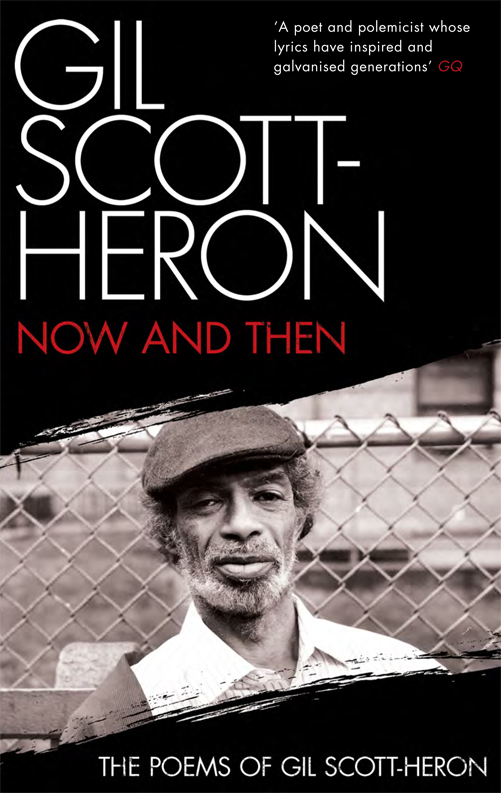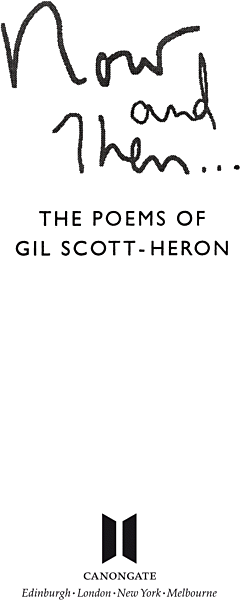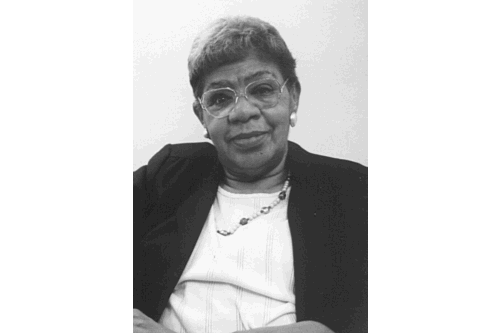Now and Then
Authors: Gil Scott-Heron



Â

âThis book is dedicated to my favourite critic, to my source of continuous joy and inspiration, the person, I would most want to be like when I grow up. She lived and taught me how to live until November 1, 1999. I will always love you, mama.'
be no bargain-day xtras on freedom and
ain't nobody givin it away.
echoes from overloud voices get rapped inside
badass black thunderclouds and carried to God who sits at
the corner of forever.
God sent down correctly.
God sent down right on timely:
music â muzak â muzick
soulfulsoothings soulfulmournings
messages that cannot be decoded by stale brains
bluesgospeljazzrhythmscreaminshouting-blasting serene
words and notes that mean:
inside you is where life is and not at woolworthless 5&10.
the message is here: inside the man
bubbling brain cells and heart/soul cells
ax-cell-er-rating faster until understood
and used and passed on and used and passed on and used
and â¦
Gil Scott-Heron
May 3rd 1971
[from
Pieces of a Man
liner notes]
Life inevitably translates into time. That is why the sum total of it is called âa lifetime'. Freedom is the potential to spend one's time in any fashion one determines. I would always want the time invested in my ideas to be profitable, to give the reader something lasting for their investment in me. It is very important to me that my ideas be understood. It is not as important that
I
be understood. I believe that this is a matter of respect; your most significant asset is your time and your commitment to invest a portion of it considering my ideas means it is worth a sincere attempt on my part to transmit the essence of the idea. If you are looking, I want to make sure that there is something here for you to find.
The public âlifetime' of an artist is comparable to that of an athlete â about five years. From the thousands of individuals who consider themselves candidates for visibility and public notice, few âmake it'. I have been blessed by the grace of âthe spirits' with the public's attention for nearly six of those lifetimes â songs that I've sung and poems that I've written have been heard on every continent, in every country where people have records and books. How could I possibly complain?
This is an âoverlapping collection'. It necessarily contains a number of poems that appeared in
So Far, So Good
and a few from
Small Talk at 125th and Lenox
. I say ânecessarily' because their inclusion satisfies the requests of people who have asked for the written text of poems from albums, and also gives me a chance to share poems that I feel are worthwhile but were not recorded. Even if you have heard these pieces sung or recited
in the past, reading these poems may offer you a fresh perspective on some of my ideas.
You don't think that rap is a brand new style?
No. In fact folks been rapping for a good little while
.
Which brings us to why I am reluctant to accept the title of âGodfather of Rap'. There still seems to be a need within our community to have what the
griot
supplied in terms of historical chronology; a way to identify and classify events in black culture that were both historically influential and still relevant. In basketball for example, Michael Jordan was the first âSkywalker' unless you'd seen David Thompson. Dr. âJ' was the only âSurgeon and General' who could rebound like a center, take the ball full court like a guard and dunk like nobody's business â unless you'd seen Connie Hawkins. In the same way, there were poets before me who had great influence on the language and the way it was performed and recorded: Oscar Brown Jr, Melvin Van Peebles and Amiri Baraka (a.k.a. LeRoi Jones) were all published and well respected for their poetry, plays, songs and a range of other artistic achievements when the only thing I was taping were my ankles before basketball practice. It was The Last Poets (both groups), and their percussion-driven group deliveries, who made the recordings which serve to place my title as âGodfather' in question. If there was any individual initiative that I was responsible for it might have been that there was music in certain poems of mine, with complete progressions and repeating âhooks', which made them more like songs than just recitations with percussion. I put this down to my background as a piano player prior to my attempts as a songwriter or to writing poems that could be performed in a musical setting.
The character of those pieces, particularly the early ones, brought about descriptions and analyses from journalists and critics that not only took in the metric and rhythmic values of them as poems or songs, but stumbled to conclusions about our philosophy. Because there were political elements in a few numbers, handy political labels were slapped across the body of our work, labels that maintain their innuendo of disapproval to this day. Words like âradical' and âmilitant' and âmuckraker' stuck out in the reviews like weeds in a rose garden. Those terms were amusing at first because we had no idea that they were âterminal'. We attributed them to idiots under the pressure of editor-inspired deadlines who had not bothered with the words, but responded only to the street-sound drumbeats that sounded as if they were calling for the revolution that so many journalists in the late '60s thought would bring the end of the world.
So if it ain't exactly rap, and it ain't radical militant muckraking, what is it? Because of the contributions of Ron Carter and Hubert Laws on
Pieces of a Man
and the background of Bob Thiele, the owner-producer of The Flying Dutchman record label as a âjazz' producer, Brian Jackson and I became âjazz' artists. It certainly couldn't have been because of guitarist Bert Jones or drummer Bernard Purdie, and I doubt if it was because of âThe Revolution Will Not Be Televised' or âSave the Children'.
I felt awkward with the âjazz' label because that associated my efforts at song-writing and piano-playing with Duke Ellington and Miles Davis and Dolphy and Coltrane and ⦠you dig? The closest I thought I would ever get to them was with the song âLady Day and John Coltrane', an up-tempo blues tribute to two of my favorite musicians. It was enough to make you think that
if you wrote a hymn you got an automatic one-way ticket to heaven.
So what did we have in total? A militant-radical-muckraker? That's a great deal of description without even the briefest inference that there might be a piano player in the house. Rarely and barely one word about âI Think I'll Call it Morning' or âSave the Children' or âGive Her a Call'.
I must also admit that some of my poetic ideas have not been all my own. I rarely wrote lyrics for Brian Jackson melodies without Brian giving me a point of reference for direction. There were also times when I ran into places along the song's road that I could not navigate, and lines that completed verses and supports for bridges were âgiven to me'. By âspirits'. The lyrics were âblessings'. For me these songs became âspirituals'.
I have been blessed because I have had the opportunity to do what I enjoy and find it to be something that others enjoy also. Many of my favorite ideas are here. It is kind of you to take an interest. I hope that you enjoy them as much as I have enjoyed preparing them to be shared. I do hope you enjoy these things that I have been taught along the way. They are the most valuable things I have.
They represent hours of concentration
And seconds of spiritual inspiration
With most of the beauty that I have seen
And what I have learned about what it all means
To be lifted by âthe spirits' and touched from within
To a place I can smile inside ânow and then
'
Gil Scott-Heron
November 3rd 1998
I have no idea how many times I've been asked what I call my music, or how many jokes I have thought up to substitute for a serious answer â âI call it collect', I might say, âI call it mine', was another.
Collectively, at various times, we have called what we did
Midnight Music, Third World Music
, and
Bluesology
. Seriously trying to define it I've said it is
Black
music or
Black
American
music. Because
Black Americans
are now a tremendously diverse essence of all the places we've come from and the music and rhythms we brought with us. And it has been our way of paying tribute and offering respect that we have included the many facets of our community.
But what do you call reggae, blues, african vibration, jazz, salsa, chants and poetry?
In truth I call what I have been granted the opportunity to share âGifts'. I would like to personally claim to be the source of the melodies and ideas that have come through me, but that is just the point. Many of the shapes of sound and concepts have come upon me from no place I can trace, notes and chords I'd never learned, thoughts and pictures I'd never seen â and all as clear as a sky untouched by cloud or smog or smoke or haze. Suddenly. Magically. As if transferred to me without effort.
My blessings have not just been words and notes. Not just art. My life has been blessed. With the joy of my children with the strength of my family with the opportunity to share something of great value that has brought a great number of people both pride and pleasure.
They have been gifts from the Spirits â so perhaps these songs
and poems are âspirituals
'.
Don't ever let the spirits die.
Gil Scott-Heron
November 1993 [from
Spirits
liner notes]
